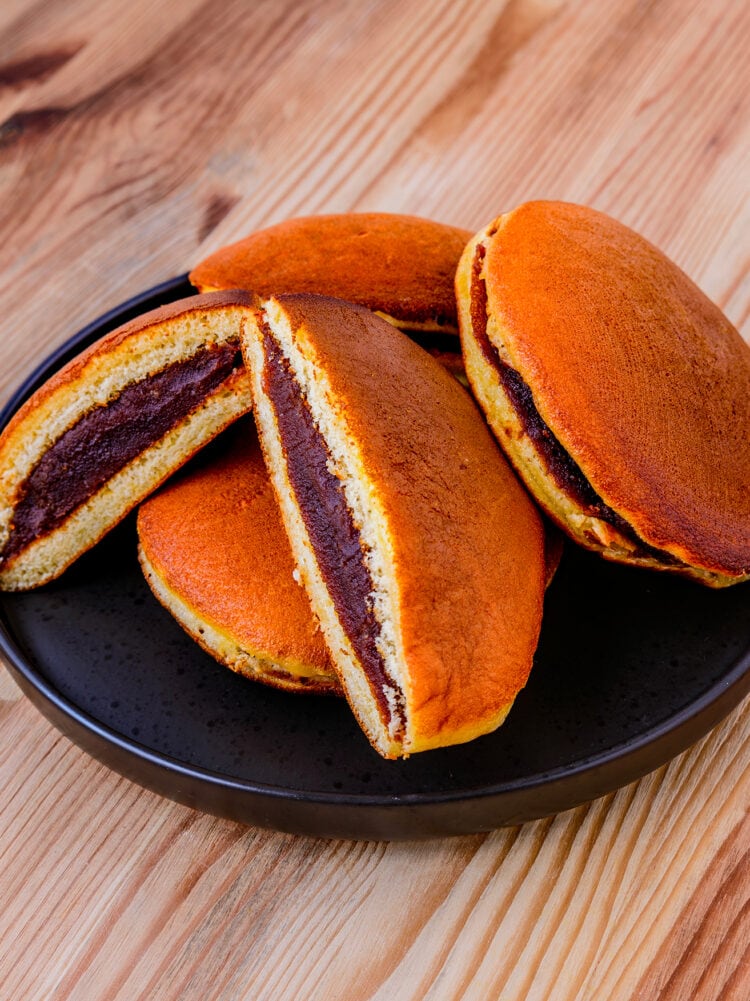Discover a delicious recipe for making Japanese Dorayaki—a super fluffy Japanese pancake that looks like an American pancake, but is filled with a sweet paste, sandwich-style. Sweet treat
Dorayaki: What is it?
Dorayaki is a Japanese dessert made of two soft, sweet pancakes sandwiched together with a filling of sweet red bean paste (anko) in the center.
This treat is famous around the world, especially thanks to the 1970s cartoon character Doraemon, who can never resist this snack—even falling for every trap involving it.
The film “Sweet Bean” by Naomi Kawase, released in 2015, also played a big role in making Dorayaki popular in France. The story follows a small Dorayaki shop in Tokyo, run by a withdrawn man whose life is upended by the arrival of an elderly woman who is an expert in anko.
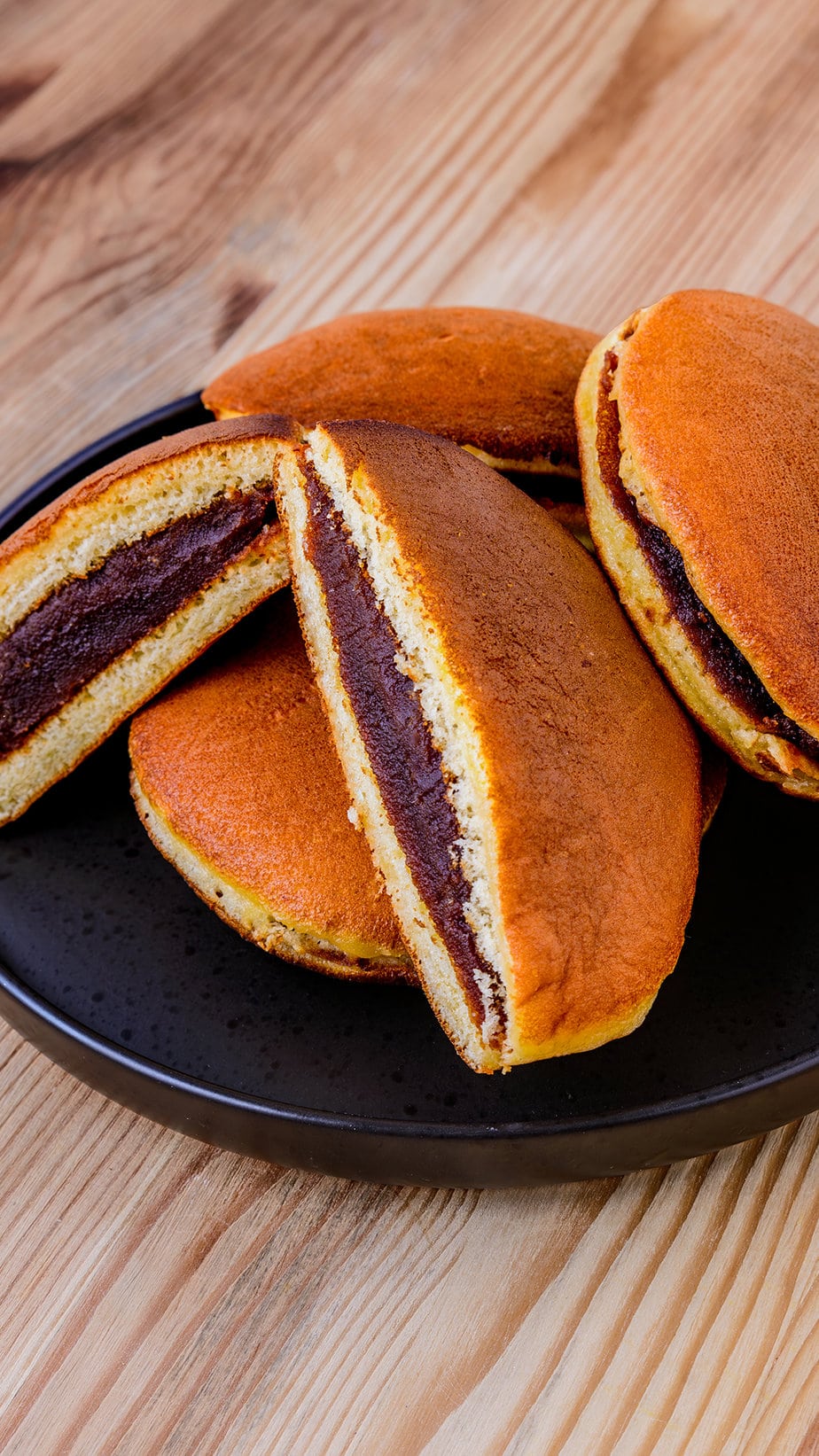
Anko Expert?
What I love about Japanese food culture is how every aspect of cooking—even the most specific ones—are taken to the next level, to the point of true expertise. Or should I say, mastery.
Whereas in France, we might joke about a “Master Kebab Chef,” in Japan, the title of Master Sushi Chef, Master Mochi Maker, or in this case, an expert in red bean paste, is taken very seriously.
I go into more detail in my Anko recipe, but there are two main types, and each can be refined to achieve a “perfect” texture. I won’t go any further into it—I’ll leave that to the true masters.
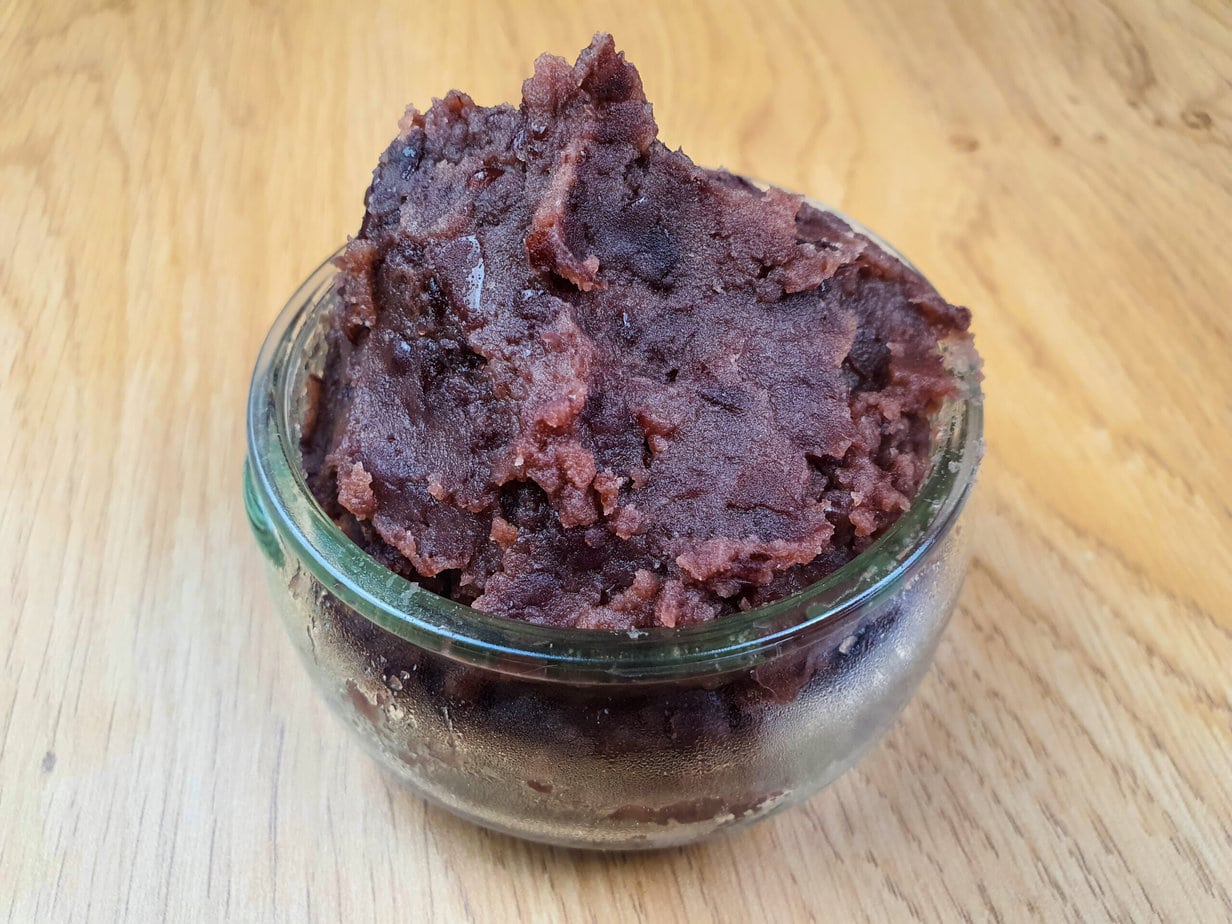
In Japan, Dorayaki isn’t just enjoyed as a dessert—it’s also a popular energy snack eaten any time of day. The word “dora” means gong, referring to the shape of Dorayaki, while “yaki” means grilled or cooked, just like Yakitori, Yakisoba, and Yakiudon.
These little treats are especially enjoyed at breakfast or as an afternoon snack, offering a comforting, nostalgic moment. For many Japanese people, Dorayaki is pure comfort food—paired with tea or coffee, it brings a sense of calm and sweetness, capturing the beauty of the moment in its simplicity.
Main Ingredients in Dorayaki
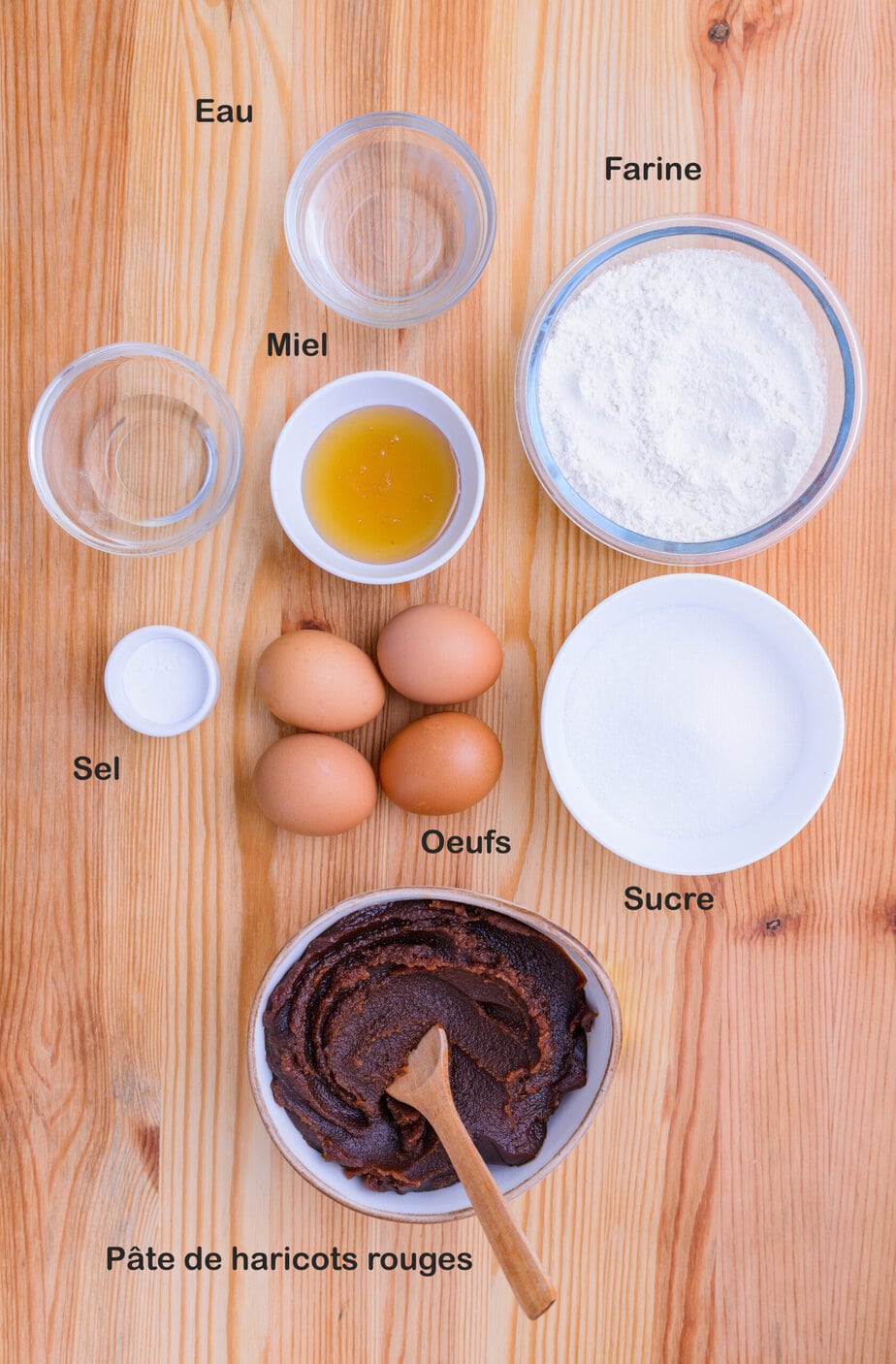
Eggs: Essential for the texture, the high egg content in this recipe also gives Dorayaki their beautiful yellow color, which sets them apart from American pancakes.
Flour: Use regular all-purpose wheat flour—no need to overthink it. T45 or T55 will work just fine. Unlike dango, this time you want ordinary flour.
Sweet red bean paste: Honestly, red bean paste is just delicious—I could eat it by the spoonful. But let’s be clear: you can use WHATEVER YOU WANT. As long as it’s sweet and spreadable, it’ll work. Try chestnut cream, black sesame paste, lotus paste, taro paste, mung bean paste, or even your grandma’s strawberry jam—feel free to experiment!
Sugar: This is a hot topic—my readers know all about my sugar addiction (and my garlic addiction, too), and you often like to cut down the sugar in my recipes. While it doesn’t make much difference for my American mom’s cookies, here we’re working with small quantities and reducing the sugar too much can really change the result. So, adjust at your own risk.
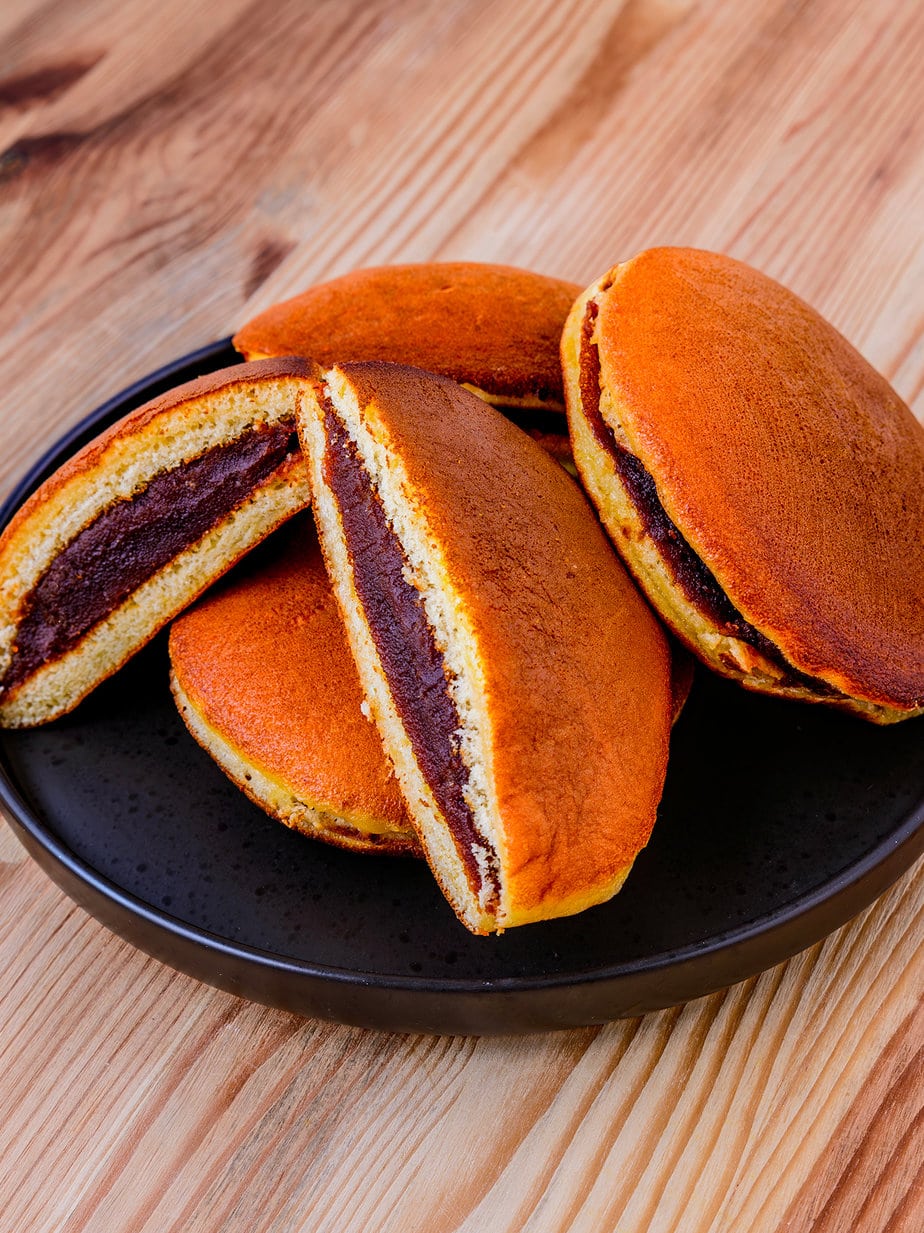
Ingredients
- 4 large eggs
- 140 g granulated sugar
- 2 tablespoons honey
- 160 g all-purpose flour
- 1 teaspoon baking powder
- 2 tablespoons water
- neutral oil, for greasing the pan
- 520 g red bean paste Anko; you can substitute with a sweet spread or chestnut cream
Instructions
For the batter
- In a large bowl, whisk the eggs, sugar, and honey until pale and foamy.4 large eggs, 140 g granulated sugar, 2 tablespoons honey
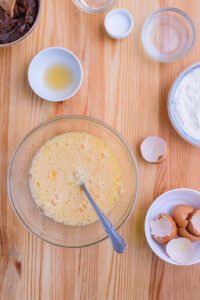
- Sift the flour and baking powder into the bowl, then whisk into the egg mixture until smooth and combined.160 g all-purpose flour, 1 teaspoon baking powder
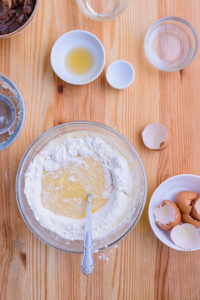
- Refrigerate the batter for 15 minutes.
- After resting, the batter will be looser and slightly smoother. Stir in half the water and check the consistency; it should resemble pancake batter. Add the remaining water as needed to reach the right consistency.2 tablespoons water
Cooking
- Heat a large nonstick skillet over very low heat for 5 minutes. Warming the pan slowly works best. Once hot, increase the heat to medium-low. Dip a paper towel into neutral oil and lightly grease the bottom of the pan, then wipe away any excess oil. This is the key to evenly golden-brown Dorayaki.neutral oil, for greasing the pan
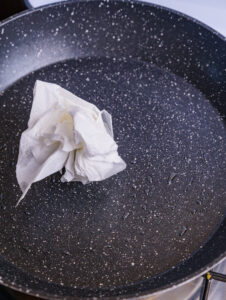
- Using a ladle or small measuring cup, pour 3 tablespoons of batter from about 8 cm above the pan to form an 8 cm round. Cook one pancake at a time.
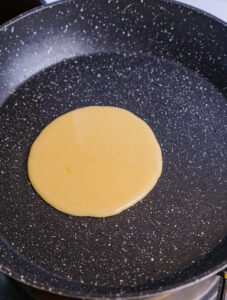
- When bubbles appear on the surface, flip and cook the second side.
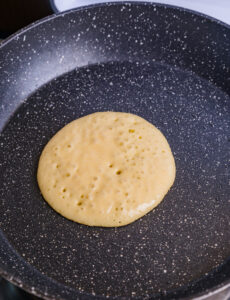
- Transfer to a plate and cover with a damp kitchen towel to prevent drying. Grease the pan between batches as needed. Continue with the remaining pancakes.
Assembly
- Assemble the Dorayaki by sandwiching two pancakes around a spoonful of sweet red bean paste. Mound a bit more paste in the center so the middle is thicker than the edges and the Dorayaki has a gentle dome.520 g red bean paste
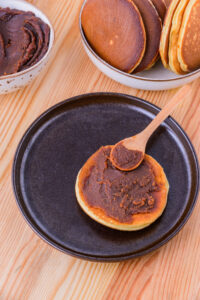
- Wrap each Dorayaki in plastic wrap until ready to serve.
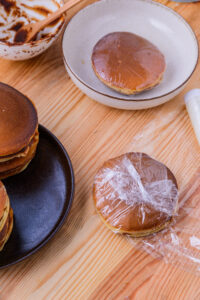
Storage
- Wrap leftovers in plastic wrap and keep in a cool place for up to 2 days. Alternatively, place in a freezer bag and freeze for up to 1 month.
Notes
Nutrition
Culinary Sources
For this recipe, I used the one from Just One Cookbook, a go-to for Japanese cooking. For the cooking technique, I followed Nino’s Home on YouTube. The video is super thorough and gave me all the tips for getting that perfect look. Because yes, in Japanese cuisine, appearance really matters.
